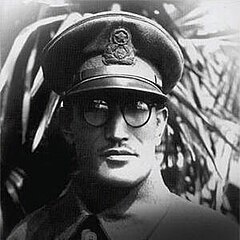Lee Beom-seok (politician, 1900)
|
|
|
| Korean spelling | |
|---|---|
| Hangeul | 이범석 |
| Hanja | 李 範 奭 |
|
Revised Romanization |
I Beom-seok |
|
McCune- Reischauer |
Yi Pŏmsŏk |
Lee Beom-seok (born December 12, 1900 in Seoul , † May 11, 1972 ibid) was a South Korean politician who was Prime Minister of the Republic of Korea between 1948 and 1950 .
Life
Lee Beom-seok completed military training in China and what was then Manchuria, and founded a nationalist Korean army group that fought against the Japanese occupation forces in Korea . Although he achieved an important success against the Japanese troops with his troops at the Battle of Qingshanli in Manchuria in October 1920 , he was ultimately forced to withdraw to the Soviet Union . Soon afterwards he returned to China and fought together with the Manchurian troops against the occupation of Manchuria by Japan in 1931 . During the Second Sino-Japanese War , which began on July 7, 1937 , he served as Chief of Staff of the 51st Army. He later founded the Korean Liberation Army and was the commander of the anti-Japanese forces of the Provisional Government of the Republic of Korea in China until Japan's surrender on September 2, 1945 .
After the division of the Korean peninsula , Lee Beom-seok went to South Korea and founded the paramilitary Korean National Youth Organization there together with Ahn Ho-sang . On August 1, 1948, he was appointed the first Prime Minister of the Republic of Korea by the National Assembly ( Gukhoe ) , which was not formally established until August 15, 1948. At the same time he served as first defense minister between August 1, 1948 and March 1949 . He held the post of prime minister until April 21, 1950, when he was replaced by Shin Sung-mo . He resigned on April 21, 1950 after his Korean National Youth Organization was not recognized as an official organization. He was then the successor to Shin Suk-woo between 1950 and his replacement by Kim Hong-il in 1951 ambassador to the Republic of China . However, he remained influential in the military and took over responsibility for the police in May 1952 as the successor to Jang Seok-yun as Minister of the Interior. A few weeks later he handed over this office to Kim Taesun .
In July 1952, Lee Beom-seok was nominated by the Liberal Party as a candidate for the office of Vice President. However, President Rhee Syng-man saw him as a possible candidate from within the party and prevented his election as Vice President. In the following years he and his supporters finally lost their posts in the party and government, whereupon he largely withdrew from political life.
Web links
- Harris M. Lentz (editor): Heads of States and Governments Since 1945 , pp. 1701 f., Routledge, 2014, ISBN 1-1342-6497-6
Footnotes
- ↑ South Korea: Primeministers (rulers.org)
| personal data | |
|---|---|
| SURNAME | Lee, Beom-seok |
| BRIEF DESCRIPTION | South Korean politician and prime minister |
| DATE OF BIRTH | December 12, 1900 |
| PLACE OF BIRTH | Seoul |
| DATE OF DEATH | May 11, 1972 |
| Place of death | Seoul |
